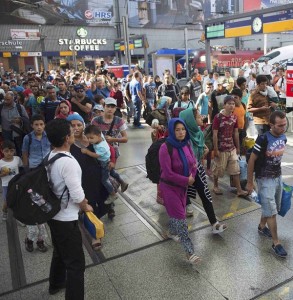The political stakes of migration
The quickening flow of migrants from Middle East, through Turkey, to Greece, Balkans and onward north, is turning up the heat on unlikely new leader across Atlantic.
As temperatures drop across Europe, quickening the flow of migrants from the Middle East, through Turkey, to Greece, the Balkans and onward north, the crisis is turning up the heat on an unlikely new leader across the Atlantic.
Justin Trudeau, Canada’s newly elected prime minister, is under pressure to stand by his Liberal Party’s campaign pledges, not least of which was a bold plan to airlift 25,000 Syrian refugees by year’s end in an operation that would reprise the 1979 rescue flights from Vietnam. Just days after his resounding victory, Trudeau assured that he was “getting cracking on [this] right away”.
Why is he getting involved? Though 25,000 represents a small fraction of the millions displaced by Syria’s relentless civil war, Trudeau’s intervention is very significant. It is one of the few positive responses by a Western leader with executive authority. The first came from German Chancellor Angela Merkel but she is increasingly under pressure from twin troubles — how to accommodate the ceaseless refugee influx while dealing with an ugly backlash that has led to attacks on migrant centres across the country.
One of the truest indicators of Germany’s rising disquiet over the refugee issue may be insights unintentionally provided by a new film Er ist wider da (Look Who’s Back). It nonsensically has Hitler reappearing in Merkel’s Germany and travelling around the country meeting ordinary people.
The actor who plays the Hitler character meets with real people on camera and some of the things they say must surely worry Merkel. When Hitler asks a woman where the problems in Germany are coming from, she immediately points to the foreigners arriving in droves. Another man claims that immigrants from Africa are dragging down Germany’s average IQ by about 20%
This hostility towards migrants gets even less amusing in Sweden, where a masked man with reported far-right sympathies killed a teacher and a student in a sword attack at a school that hosts many newly arrived refugees. To the west of Germany, there is some shock and a lot of awe at the anti-immigration feelings crystallized by Robert Menard, who headed Reporters Without Borders before winning the mayoral election in the southern French town of Beziers in 2014 on a ticket loosely allied to the far-right Front National.
Menard in September deliberately allowed himself to be filmed telling Syrian squatters they were not welcome in his town because they were “stealing” water and electricity. He claimed on TV that he counted the first names of nursery and primary school children in Beziers and was able to determine that 64.6% were Muslim.
It is a criminal offence in France to collect data on race or ethnicity and French Interior Minister Bernard Cazeneuve publicly deplored Menard’s claim; however, there was a vein of admiration running through the townspeople’s discourse on their mayor’s forthrightness.
This is significant in all sorts of ways. With a population of more than 71,000, Beziers is by far the biggest of the 11 French towns run by a mayor aligned with the Front National. Beziers has been referred to as a “laboratory of the far right” and that Menard’s anti-immigration experiments will become more significant as the refugee surge continues.
Clearly it is a risky business for a Western leader to assume the mantle of a modern-day Moses and promise to lead the refugees to safety. This is what makes Trudeau’s reiterated pledge to fly thousands to Canada puzzling — except that there is a historical difference between North America and Europe in their approach to migrants.
For Europe, they are always the “other” and there is the deeply rooted memory of the conflict with Islam, including the Ottoman campaign to lay siege to Vienna. In the United States and Canada, the immigrant is part of family folklore — the voyage across the seas by grandfathers, grandmothers, great-uncles and aunts are stories that are remembered and retold.
Canada’s self-confidence on the migrant issue is a shiny hopeful skein in the dark and fraying European tapestry of fear and woe.


